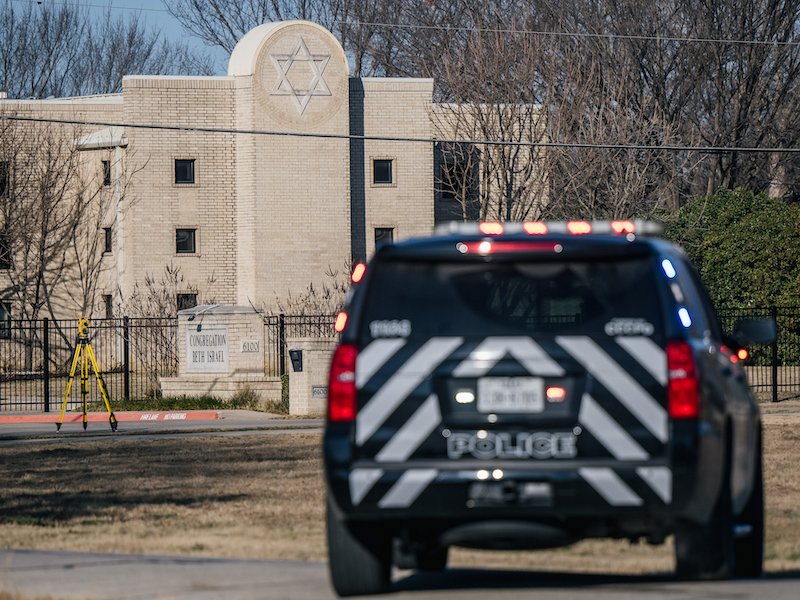Synagogue security
Israeli company hopes tech, and $10 million, will keep U.S. Jews safe
Gabriel Network hopes to provide synagogues with a system to detect attacks and respond to them quickly.

Brandon Bell/Getty Images
A law enforcement vehicle sits near Congregation Beth Israel in Colleyville, Texas on January 16, 2022, the day after the synagogue experienced an attack.
An Israeli company that develops security technology is now setting a goal of raising $10 million to spread its product across Jewish institutions in the United States in the wake of last month’s attack on a congregation in Colleyville, Texas.
Gabriel Network, the security firm, provides a variety of tools for synagogues, schools and the like to detect and respond to attacks. Gabriel’s system includes a smart panic button, gunshot detection, live video and audio, an interactive floor map of the building and the ability to control access points.
An initial $1 million came from an anonymous donor who connected with Gabriel CEO Yoni Sherizen last week. It will pay for 500 synagogues and schools to install and use the technology. The donation will cover the cost of Gabriel’s starter kit, installation, training and the first year of service. Institutions that want to continue past the first year will pay an average of $95 per month, with the price changing based on the size of the building and similar factors.
Now, Gabriel hopes to recruit another nine philanthropists to each match the $1 million donation, for $10 million that it hopes will secure every Jewish communal building in the U.S. for a year.
Using $100,000 from the initial donation, paired with matching funds from local donors, The Jewish Federation of Metropolitan Detroit told eJP it will be equipping all synagogues in the city’s metro area with Gabriel’s tech. Gary Sikorski, director of community-wide security for the federation, described the technology as “an essential part of our community-wide security infrastructure” and “our eyes and ears.” He added that events like the Colleyville attack “demonstrate the importance of having cameras within Jewish communal buildings that can be easily accessed remotely during a crisis.”
The technology is currently being used by 20 Jewish schools, a college campus and a Christian community in the U.S., and orders are out for 60 more, Sherizen told eJP. The beneficiaries of the recent donation are being determined on a first-come, first-served basis.
“Our system provides instant visibility and communication into a situation. So you would be able to see and hear exactly what’s going on throughout the building,” Sherizen told eJP. “And that can often lead to a much faster response, meaning if [security forces] are going to either breach the building, or attempt to pull people out, or neutralize someone on the inside, that can be a very dangerous proposition. So when you have that visibility, it makes it much more effective and much safer for everyone involved.”












